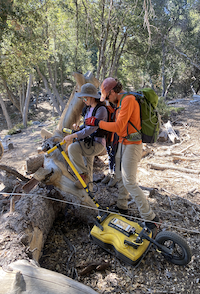Pursuing a career in scientific research can be nerve wracking; it involves many years of school and lots of hard work, and it can feel hard to see the light at the end of the tunnel. But, it can also be extremely rewarding, creative, and exciting to explore one’s passions in such an inquisitive way. We asked BCZN scientists what advice they’d give to someone considering a career in geoscience research, and they gave us a few tips and tricks of the trade, which you can read below:
Considering A Career in Science Research? Team Bedrock Shares Their Advice
Posted: March 2, 2026

Reading & Writing are Imperitive
Take the time to learn how to read and write scientific literature. Reading, understanding, and utilizing previous literature in one’s own research is integral to a career in science. While it may be tempting to focus more on one’s own projects rather than what has come before, “...the value of our individual research becomes clear only when it is collocated in the context of what has been previously done…”, shares Dario Grana, Professor at University of Wyoming. It is important to not only learn how to search through the literature - what is often taught in undergraduate spaces - but also to contextualize one’s own investigations in the larger scheme of scientific understanding.
Writing is also integral to the research process. “Almost all scientific careers require you to be a good (clear, accurate, and persuasive) writer”, says David Litwin, Postdoctoral Research at GFZ - Potsdam, “While some writing can (but perhaps should not) now be automated, this doesn't negate the value of writing in thinking, which will always be a useful tool.” The more you expose yourself to scientific writing and write yourself, the better you’ll get; it’s like a muscle, and develops with practice.
Open Yourself Up & Don’t Hold Back!
People often associate scientific careers with specializing or narrowing in on one specific field. But, as Megan Simonsen, a graduate student at Johns Hopkins University will attest, focusing too hard on one discipline can be limiting. “Research is about thinking with [sic] different perspective[s],” she shares. This could look like taking an interdisciplinary approach to your research, or taking the time to understand what other people in your general field are working on. But regardless of how you incorporate different disciplines and areas of thought, interdisciplinary work is vital to complex problem-solving. How can we solve huge problems without approaching them from multiple vantage points? This is one of the pillars of critical zone science, which you can learn about here.
It may feel tough to introduce interdisciplinary work into one’s research or graduate school experience, because it can often produce more questions than answers. But Rachel Uecker, PhD candidate at Clemson University encourages people considering scientific careers to lean into that uncertainty. “It wasn’t until I got to graduate school and began working closely with professors that I realized how much they welcome questions. They are there to help you. Don’t hold back—it’s better to ask and clarify than to miss out on learning something important.”. While it may be tempting to give into the pressures of perfectionism and try hard to appear like you know everything, it’s important to recognize that there are so many people who are there to support and guide you in your learning, not just evaluate your outcomes.
You Are The Future!
Being in academic spaces is often overwhelming, and considering a career in Earth science can often feel like a one-way ticket to climate pessimism. But know this - people in the academic generations before you are inspired by the young people they are able to see come through their programs
When we asked Dr. Kamini Singha, Professor at Colorado School of Mines, what helps her feel less pessimistic about the state of the planet, her first answer was her students. “The thing that gives me the most hope is certainly the students that I work with.”, she shared with us in an interview last year. “Occasionally I’ll hear someone say something like, ‘you know, millennials’. They probably said the same thing about Gen X when I was young - you know, kids these days. But I’m pretty psyched to think that my students are going to be people that are out there on the planet going forward.”
At The End of the Day...
...whether or not a research career is for you, we hope these tips made your decision a little more clear. For more information on BCZN scientists, click here.

 Bedrock
Bedrock